From a supported country to a Global Leader in Mine Action: Cambodia's Goal of a World Free of Landmines
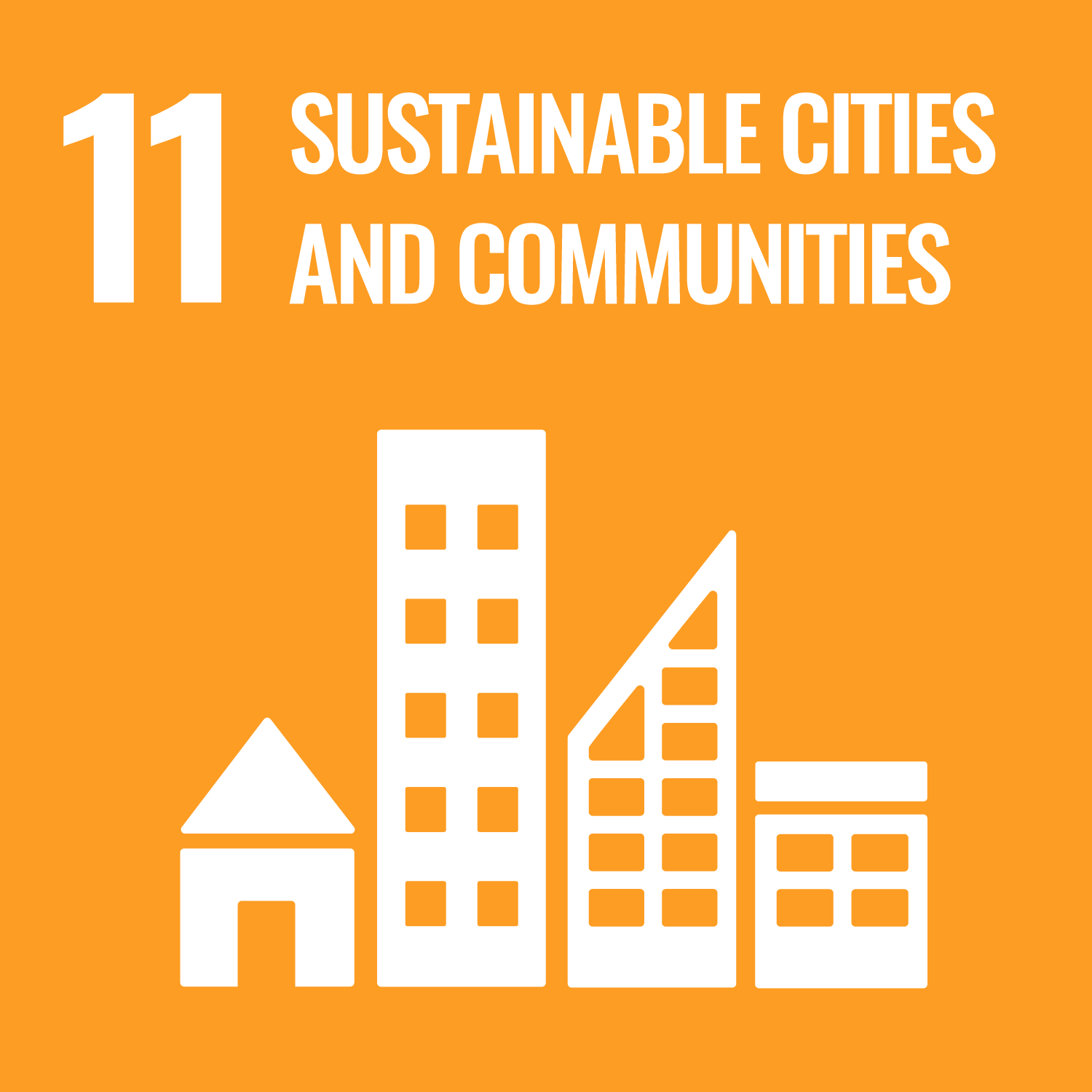
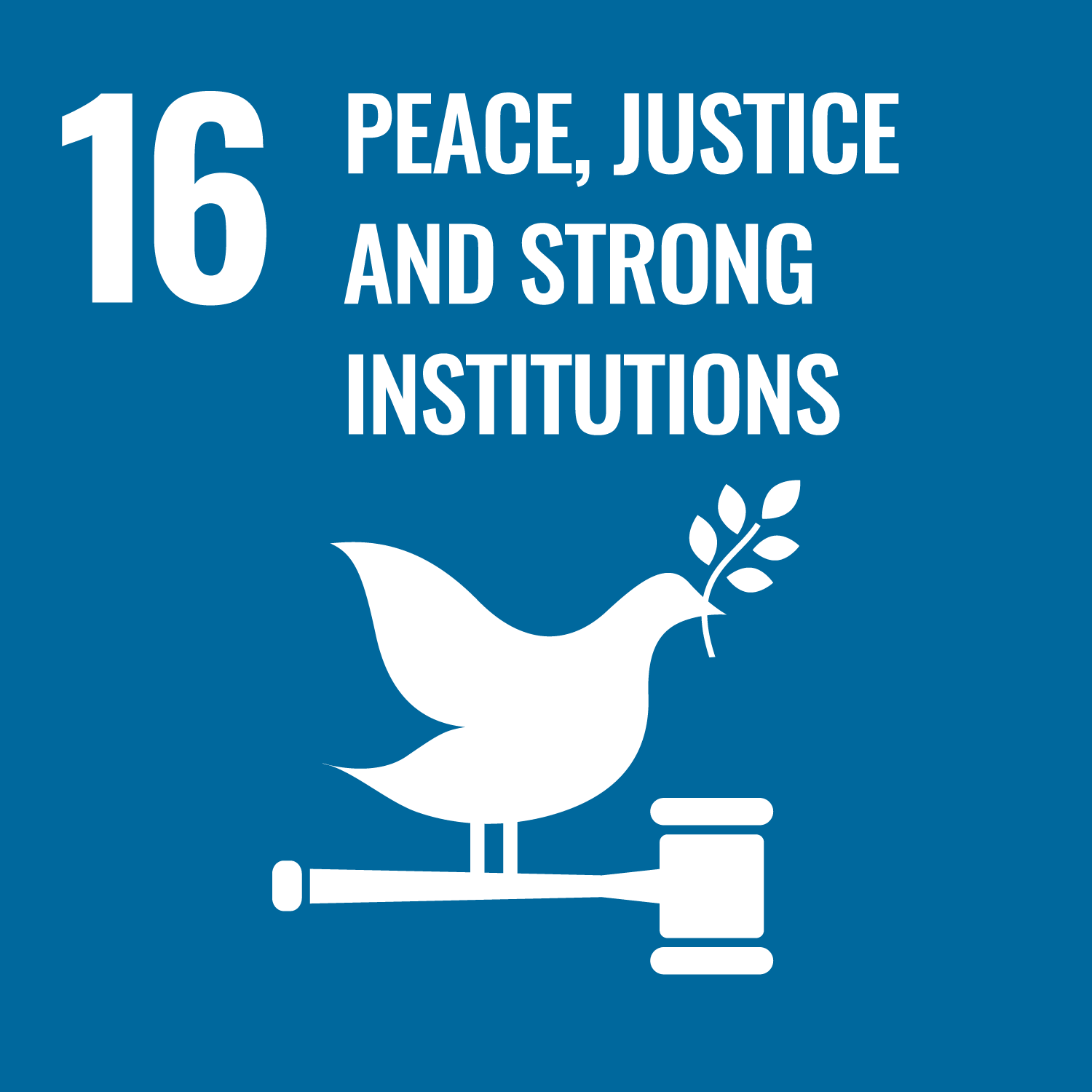

2024.10.25
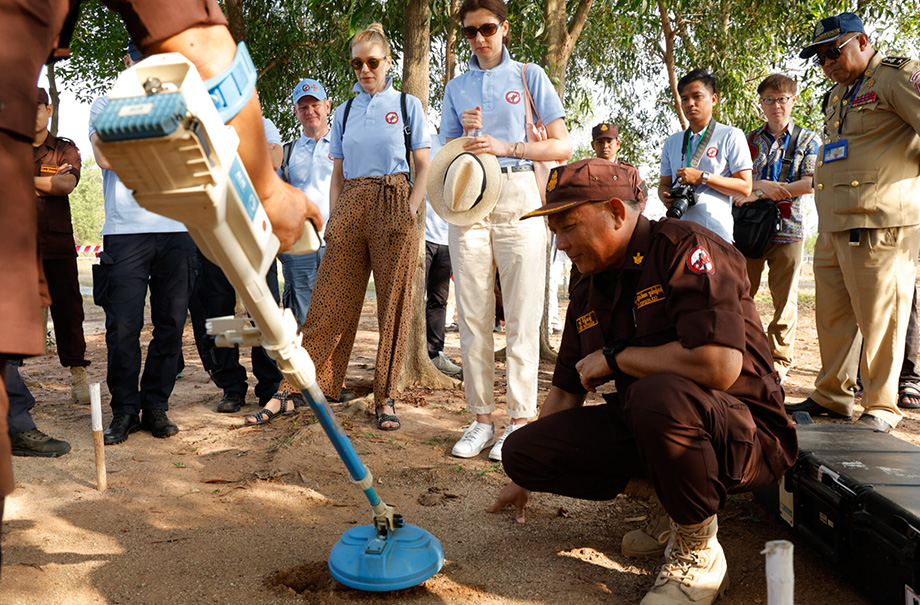
CMAC (Cambodian Mine Action Center) staff are providing training to SESU (State Emergency Service of Ukraine) personnel.
Over the 20 years of the Vietnam War and the subsequent conflict, approximately 2.75 million tons of bombs were dropped on Cambodia, and an estimated 4 to 6 million landmines were buried. Following the 1991 Paris Peace Agreement, the Cambodian Mine Action Centre (CMAC) was established by the United Nations Transitional Authority in Cambodia (UNTAC) to address the landmine issue. In 1993, CMAC became a Cambodian government organization, but despite the signing of a peace agreement, conflict continued, slowing down landmine clearance operations.
Komukai Eri is a JICA Senior Advisor on peacebuilding. She served twice as a program officer at JICA Cambodia office, in 2000 and 2001. One of her tasks is to work with CMAC. "After data collection on landmine casualties started in Cambodia in 1992, the year with the highest number of landmine victims was 1996,” she says. “Following the peace agreement, many refugees returning to Cambodia from abroad, including Thailand. They stepped on landmines in the process of repatriation and setting up their lives. There were also cases of people being injured while fetching water."
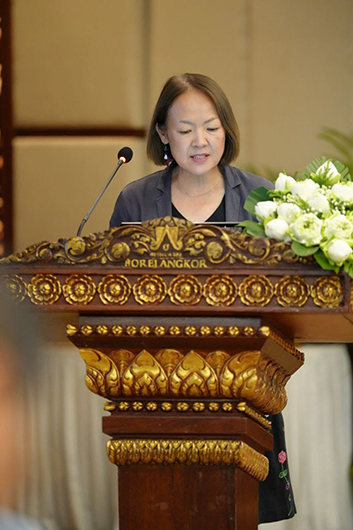
Komukai Eri, JICA Senior Advisor
“People in Cambodia say that peace truly arrived not in 1991 with the peace agreement, but after the collapse of the Khmer Rouge in 1998,” Komukai says. “Before the collapse, mine actions were limited to emergency responses for call of the accidents at the field, and there were no long-term plans for mine action.”
The reconstruction of roads and farmland began active in earnest after peace was restored in 1998. Landmine clearance was essential for advancing infrastructure development and agricultural promotion.
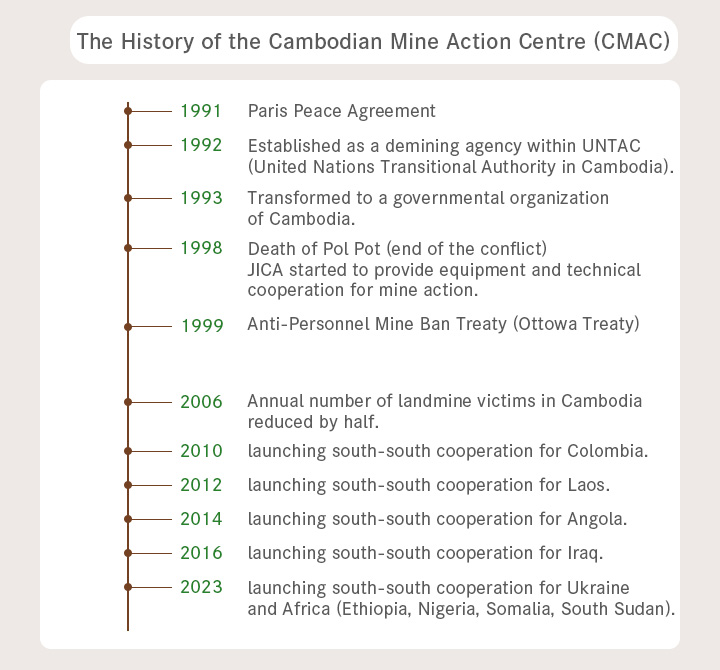
Chronology of the Cambodian Conflict and Japan's Cooperation with CMAC.
JICA has provided support to CMAC since 1998, primarily by introducing equipment to improve the efficiency of landmine clearance and strengthening organizational management.
Identification of buried landmines takes a significant amount of time. In Cambodia, many are buried in regions with dense shrubbery. Previously, tree cutting accounted for about 70 percent of the total demining effort. The introduction of Japanese-supplied brush cutting machines, however, has made landmine clearance safer and more efficient.
By introducing new equipment and improving technology and methods, CMAC has significantly increased its annual land released area. From approximately 10 square kilometers between 1995 and 1999, the area released expanded to about 282 square kilometers in 2023.
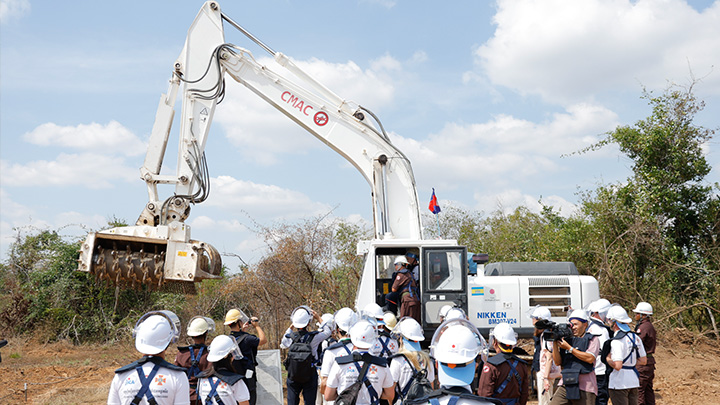
Japanese-made demining machines provided by Japan and utilized by CMAC. By introducing new equipment and making improvements in techniques and methods, CMAC's annual landmine-cleared area has increased nearly 28-fold from 1999 to 2023.
Additionally, strengthening capacities—such as developing information systems to compile data on minefields, managing equipment, and providing training—is essential for sustainable operations. Many CMAC staff members are former combatants, which has led to conflicts and struggles among those who once fought on opposing sides of the conflict. Komukai believes, however, that CMAC has gradually transformed into a strong organization focused on advancing mine action for national reconstruction and development.
As Cambodia developed its expertise in mine action with JICA's support, it also began sharing this knowledge and technology with other countries. Since 2010, CMAC with JICA’s support has trained over 500 government officials in landmine affected countries including Colombia, Laos, Angola, and Iraq.
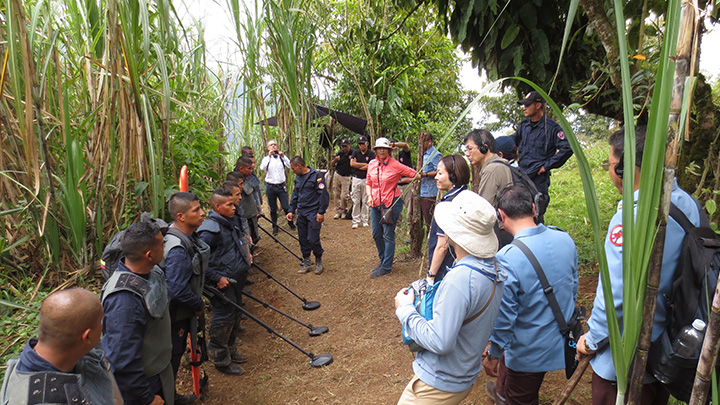
Komukai (center) visiting a demining site in Colombia with CMAC staff
“Cambodia has been learning from other countries in many sectors,” Komukai says. “In the field of mine action, however, Cambodia has become a teacher, which has significantly boosted the confidence and pride of the Cambodian people.”
In 2023, cooperation began with Ukraine, where war is still ongoing. From July to August, training sessions were held in Cambodia for personnel from Ukraine's State Emergency Service involved in landmine clearance, focusing on the operation and maintenance of demining machines. CMAC Director General Heng Ratana emphasized the importance of Cambodia— a nation that understands the pain and anger of war— in contributing to peacebuilding efforts in war-torn countries.
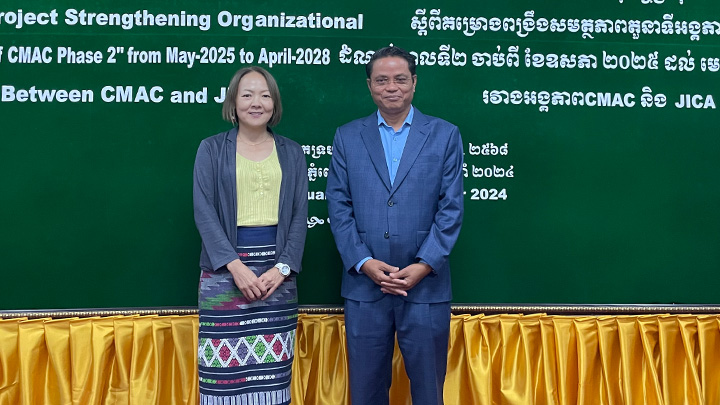
CMAC Director General Heng Ratana and JICA Senior Advisor Komukai. Director General Ratana has experienced the loss of family members due to the conflict.
CMAC's expertise is also being shared in Africa. In October 2023, JICA, CMAC, and the UN Mine Action Service co-hosted a workshop in Kenya for responsible government officials from landmine-affected countries, including Ethiopia, Nigeria, Somalia, and South Sudan. In January, representatives from these four countries visited Cambodia to observe CMAC’s activities and discuss mine action strategies tailored to their nations’ needs. Komukai, who accompanied the delegation, noted a significant mindset shift among the African participants.
“After observing CMAC's efforts to improve mine action technology, strengthen its organization, and advocate for the importance of mine action with their own government,” Komukai says, “the African officials seemed to realize that mine action should not depend on external actors, but something they are responsible for.”
She believes JICA’s nearly 30 years of cooperation with CMAC has contributed to strengthening national capacity, and that the importance of mine action is now spreading globally.
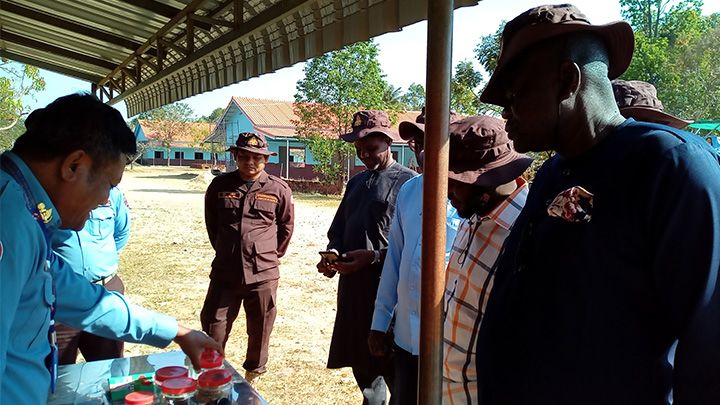
African government officials from Ethiopia, Nigeria, Somalia, and South Sudan observing CMAC's activities.
According to Komukai, effective mine action depends on the people of the affected country having the determination to improve their land for future generations. “By removing the negative legacies they can help create a peaceful nation,” she says. “This commitment will ultimately lead to a mine-free world.”
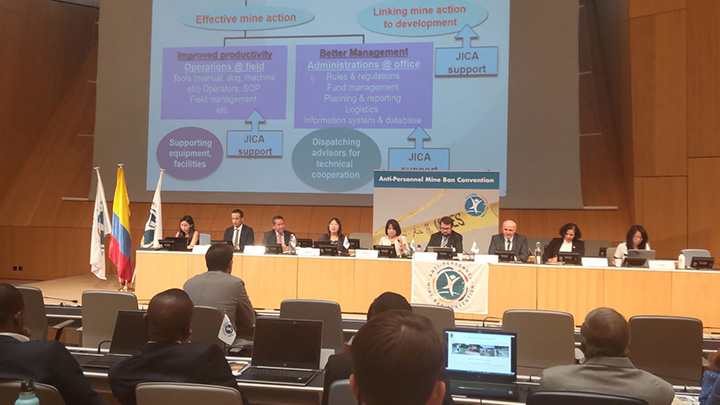
The scene at the intersessional meetings of the Anti-Personnel Mine Ban Convention (Ottawa Treaty) held in Geneva, 2022.
The 5th Review Conference of the Anti-Personnel Mine Ban Treaty (Ottawa Treaty), which seeks to eliminate anti-personnel mines, will take place in Cambodia this November. An action plan for mine action over the next five years is expected to be submitted. One of the focuses will be national capacity in mine action based on long efforts by Cambodia.
Next year, Japan will chair the meeting of state parties to the Ottawa Treaty. In July, the Japanese government announced the launch of a “Comprehensive Package for Mine Action Support” and the “Japan-Cambodia Landmine Initiative.” These initiatives aim to promote triangular cooperation among countries, with Cambodia as a hub, and to utilize the latest scientific advances in mine clearance operations. Several Japanese companies are currently developing new technologies for mine detection and clearance, and field tests in collaboration with CMAC are already underway in Cambodia. Further applications are expected in the future.
scroll